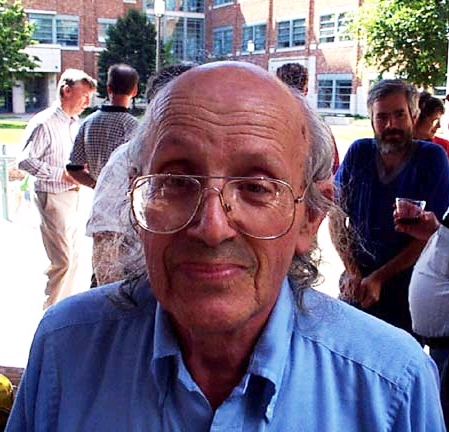Richard "Dick" Davisson in the courtyard outside the physics building
at the University of Washington (2000 or 2001).
Image courtesy of Christophe Verlinde.
I have been lucky to know a lot of talented scientists while I was working my way through school. One of my very good friends (and drinking pals), physicist Richard (Dick) Davisson, was the son of Nobelist, Clinton Davisson, who won the Nobel prize in Physics in 1937. Interestingly, his maternal uncle, Sir Owen Willans Richardson, was also a Nobel prize winner in Physics (1928). Sadly for all of us who knew and loved him, Dick died in 2004 -- much too early for all of us! At that time, I'd been working on my postdoc in NYC for nearly two years and unfortunately, unemployment was rapidly approaching, so I was unable to return to Seattle to attend his memorial service. But I learned today that some of my Seattle grad school friends have been writing a Wiki about him. It is an unconventional tribute to an unconventional man.
And for those who wish to read a little more about him, here's his obituary.


During those years at the pub, you could always rely on Dick to provide a unique and useful perspective on any problem you wanted to discuss whether it was in or out of his field. He was the most curious and insightful person I've known and was very generous and accessible with his advice and wit. Graduate students in engineering (as I was) rarely get to discuss philosophical concepts in their own field, let alone on demand at short notice on any night of the week. He was the central element of what became, for me at least, an after-hours academic culture that was as close to bohemian as a science grad might ever hope to find. There needs to be more of that in our campus pubs and cafes, but I've yet to find it. We all miss you, Dick.
This is a real surprise - I hadn't thought about Dick Davisson for years. I was a physics undergrad at UW (BS, 1981) and often encountered Dick in the (old) Physics building. He was an incredibly bright and interesting guy, who also didn't care too much about conventional academic achievements (degrees, promotion, tenure, etc. - As I recall, he didn't even have 'real' faculty appointment, but was certainly treated like a colleague by all of the members of the department.)
Thanks for this post.
not a problem, mark! i was pleased and surprised to learn that there is a wiki about him, so of course, i had to share that link with my readers. and reading about him makes me miss him all over again .. sigh.